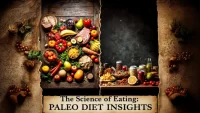The world of nutrition is constantly evolving, with new research and innovations shaping the way we eat and live. In 2025, dietary trends are focused on sustainability, gut health, plant-based eating, personalized nutrition, and functional foods. Whether you’re a health enthusiast, a fitness buff, or simply someone looking to optimize your diet, these revolutionary trends can help you make informed choices for a healthier future.
Let’s dive into the top five dietary trends that are set to redefine nutrition in 2025.
1. Personalized Nutrition: A Tailored Approach to Dieting
What is Personalized Nutrition?
Personalized nutrition uses DNA testing, microbiome analysis, and AI-driven recommendations to create diet plans customized for an individual’s genetic makeup, lifestyle, and health goals.
Why It Matters
- Precision Health: Avoids one-size-fits-all diets and instead tailors nutrition based on unique metabolic needs.
- Weight Management: Helps in achieving optimal weight loss or muscle gain through data-driven food choices.
- Disease Prevention: Reduces the risk of chronic diseases like diabetes, heart disease, and obesity.
How to Get Started
- Use apps like ZOE or Nutrigenomix for personalized meal plans.
- Consult a registered dietitian specializing in nutrigenomics.
2. Regenerative Agriculture & Sustainable Eating
What is Regenerative Agriculture?
This farming method focuses on soil health, biodiversity, and carbon sequestration, ensuring that food production is both sustainable and environmentally friendly.
Why It Matters
- Climate Impact: Reduces carbon footprint and helps combat climate change.
- Nutrient-Dense Foods: Enhances the nutritional quality of crops and livestock.
- Ethical Consumption: Encourages mindful eating by supporting sustainable food sources.
How to Incorporate It
- Choose grass-fed, pasture-raised meats and organic produce.
- Support brands prioritizing sustainable sourcing.
3. The Rise of Functional Foods & Adaptogens
What are Functional Foods?
Functional foods go beyond basic nutrition, offering health benefits like improved immunity, cognitive function, and stress management. These include probiotics, prebiotics, omega-3-rich foods, and adaptogens.
Popular Functional Foods in 2025
- Mushrooms (Lion’s Mane, Reishi, Chaga): Boost cognitive function and immunity.
- Turmeric & Ginger: Anti-inflammatory powerhouses for gut and joint health.
- Probiotic & Fermented Foods: Kefir, kimchi, and kombucha improve gut microbiome balance.
- CBD-Infused Edibles: Emerging as natural remedies for stress and sleep support.
How to Add Functional Foods to Your Diet
- Drink matcha or mushroom coffee in the morning.
- Incorporate fermented foods into daily meals.
- Take a probiotic supplement for gut health.
4. The Plant-Based Revolution Continues
Why is Plant-Based Eating Growing?
With more consumers prioritizing health, sustainability, and ethical eating, plant-based diets continue to gain popularity. In 2025, advancements in plant-based meats, dairy alternatives, and whole-food vegan diets make it easier than ever to adopt a plant-forward lifestyle.
Key Benefits
- Heart Health: Reduces cholesterol and lowers the risk of heart disease.
- Weight Management: Supports healthy weight loss and metabolic function.
- Eco-Friendly: Uses fewer natural resources compared to animal-based diets.
Trending Plant-Based Foods
- Lab-Grown Meat: A cruelty-free alternative with a real meat texture.
- Plant-Based Seafood: Algae-based shrimp and fish are nutrient-rich and sustainable.
- Dairy-Free Innovations: Oat, almond, and macadamia milks dominate the market.
5. Intermittent Fasting & Circadian Rhythm Dieting
What is Intermittent Fasting (IF)?
Intermittent fasting cycles between periods of eating and fasting to enhance metabolism, longevity, and cellular repair.
The Science Behind IF
- Boosts Metabolism: Encourages fat burning and muscle retention.
- Supports Brain Health: Reduces the risk of neurodegenerative diseases.
- Balances Blood Sugar: Helps prevent insulin resistance and type 2 diabetes.
Circadian Rhythm Dieting
This method aligns eating patterns with the body’s natural biological clock, optimizing digestion and hormone regulation.
How to Implement IF
- Try the 16:8 method (fast for 16 hours, eat within an 8-hour window).
- Eat lighter meals in the evening to align with circadian rhythms.
Conclusion
The nutrition landscape in 2025 is evolving with groundbreaking dietary trends that emphasize personalization, sustainability, functional foods, plant-based diets, and intermittent fasting. Whether you’re looking to optimize your health, support the environment, or explore the latest in food science, these trends offer practical, evidence-based solutions to transform the way you eat.
What’s Next?
Start by incorporating one or two trends into your routine and observe the impact on your health. As technology and research advance, staying informed about nutrition trends will empower you to make the best choices for a healthier future.
FAQs
1. What is the most impactful dietary trend in 2025?
Personalized nutrition is the most transformative, as it tailors diet plans to an individual’s genetic and metabolic profile.
2. Are plant-based diets sustainable in the long run?
Yes! With advancements in alternative proteins and plant-based foods, sustainability and nutritional adequacy are improving significantly.
3. How can I start regenerative eating?
Support brands that practice regenerative farming, choose organic and grass-fed products, and reduce food waste.
4. Is intermittent fasting safe for everyone?
Intermittent fasting is generally safe, but those with medical conditions, pregnant women, or individuals with a history of eating disorders should consult a healthcare provider first.
5. Can functional foods replace supplements?
Functional foods offer natural nutrition, but some individuals may still benefit from targeted supplementation based on specific health needs.
By staying ahead of these trends, you can ensure optimal health and well-being in 2025 and beyond! Stay informed, eat smart, and embrace the future of nutrition.











